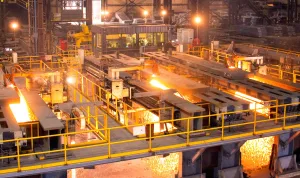Understanding Nucor Corporation’s Earnings Per Share (EPS): Key Insights and Analysis

Earnings Per Share (EPS) is a crucial financial metric that helps investors evaluate a company’s profitability and performance. For Nucor Corporation (NUE), one of the leading steel producers in the U.S., understanding its EPS can provide valuable insights into the company’s financial health, stock valuation, and overall market position. This article delves into Nucor’s EPS, how it is calculated, its significance, and what it reveals about the company’s performance.
1. What is Earnings Per Share (EPS)?
Earnings Per Share (EPS) measures the portion of a company’s profit allocated to each outstanding share of common stock. It is a key indicator of a company’s profitability and is widely used by investors to assess financial performance and compare companies within the same industry.
- EPS Formula: The basic formula for calculating EPS is:
EPS=Net Income – Dividends on Preferred StockAverage Outstanding Shares\text{EPS} = \frac{\text{Net Income – Dividends on Preferred Stock}}{\text{Average Outstanding Shares}}
- Types of EPS:
- Basic EPS: Calculated using the weighted average number of shares outstanding during a specific period.
- Diluted EPS: Accounts for all potential shares that could be issued, such as stock options or convertible securities, providing a more conservative view of earnings.
2. Nucor Corporation’s Current EPS
As of the most recent financial reports, Nucor Corporation’s EPS provides insight into its profitability and financial performance. For the latest fiscal year, Nucor reported an EPS of $12.45. This figure reflects the company’s net income divided by the weighted average number of shares outstanding.
- Historical EPS Trends: Analyzing Nucor’s historical EPS trends shows how the company’s earnings have evolved over time. Nucor has demonstrated consistent profitability, with its EPS reflecting the company’s strong performance in a cyclical industry.
- Quarterly EPS: EPS can also be analyzed on a quarterly basis to assess short-term performance. For example, in the most recent quarter, Nucor reported an EPS of $3.10, indicating solid performance amid market fluctuations.
3. Significance of Nucor’s EPS
EPS is a vital metric for investors as it provides insights into a company’s profitability, financial health, and overall performance. For Nucor, the EPS figure can reveal several key aspects:
- Profitability: A higher EPS indicates that Nucor is generating substantial profit per share, which can be a positive sign of financial health and operational efficiency.
- Stock Valuation: EPS is used in conjunction with other metrics, such as the Price-to-Earnings (P/E) ratio, to determine the stock’s valuation. A rising EPS can lead to an increase in stock price if market conditions and investor sentiment are favorable.
- Dividend Potential: EPS also affects Nucor’s ability to pay dividends. Higher earnings per share provide more room for the company to distribute profits to shareholders in the form of dividends.
4. Factors Influencing Nucor’s EPS
Several factors can impact Nucor’s EPS, including industry trends, economic conditions, and company-specific factors.
4.1. Steel Industry Trends
The performance of the steel industry significantly influences Nucor’s EPS. Trends such as fluctuations in steel demand, pricing, and competition can affect profitability.
- Demand and Pricing: Higher steel demand and prices typically lead to increased revenue and profit margins for Nucor, positively impacting EPS. Conversely, a downturn in demand or falling prices can reduce earnings.
- Cost of Raw Materials: Variations in the cost of raw materials, such as scrap metal and iron ore, impact production costs and profit margins. Efficient cost management can help Nucor maintain a strong EPS.
4.2. Economic Conditions
Broader economic conditions, including interest rates, inflation, and economic growth, also affect Nucor’s EPS.
- Interest Rates: Changes in interest rates can impact Nucor’s borrowing costs and capital expenditures. Lower interest rates generally reduce borrowing costs, potentially enhancing EPS.
- Inflation: Inflation can affect raw material costs and pricing power. Higher inflation may lead to increased costs, potentially compressing margins and impacting EPS.
4.3. Company-Specific Factors
Internal factors such as operational efficiency, management decisions, and strategic initiatives play a role in Nucor’s EPS.
- Operational Efficiency: Nucor’s ability to manage production costs, optimize operations, and innovate can positively influence EPS. Efficient operations help the company maintain profitability even in challenging market conditions.
- Strategic Initiatives: Strategic investments and acquisitions can impact Nucor’s earnings growth. For example, expanding production capacity or entering new markets can lead to higher revenue and EPS.
5. Comparing Nucor’s EPS to Peers
Comparing Nucor’s EPS to its peers in the steel industry provides additional context for evaluating its performance.
- Industry Benchmarks: Assessing Nucor’s EPS relative to industry averages and competitors helps gauge its market position. A higher EPS compared to peers may indicate stronger performance and competitive advantage.
- Peer Analysis: Key competitors such as U.S. Steel and Steel Dynamics provide benchmarks for comparison. Analyzing how Nucor’s EPS stacks up against these companies can reveal insights into its relative strength and market position.
6. Conclusion
Nucor Corporation’s EPS is a critical metric for understanding the company’s profitability and financial performance. With an EPS of $12.45 for the most recent fiscal year, Nucor demonstrates strong earnings potential, reflecting its robust position in the steel industry.
Investors use EPS to assess profitability, stock valuation, and dividend potential. By analyzing Nucor’s EPS alongside industry trends, economic conditions, and company-specific factors, investors can gain a comprehensive view of the company’s financial health and make informed investment decisions.
Understanding Nucor’s EPS and how it compares to industry peers provides valuable insights into the company’s performance and market position. As Nucor continues to navigate the steel industry’s cyclical nature, its EPS will remain a key indicator of its financial success and investment potential.



